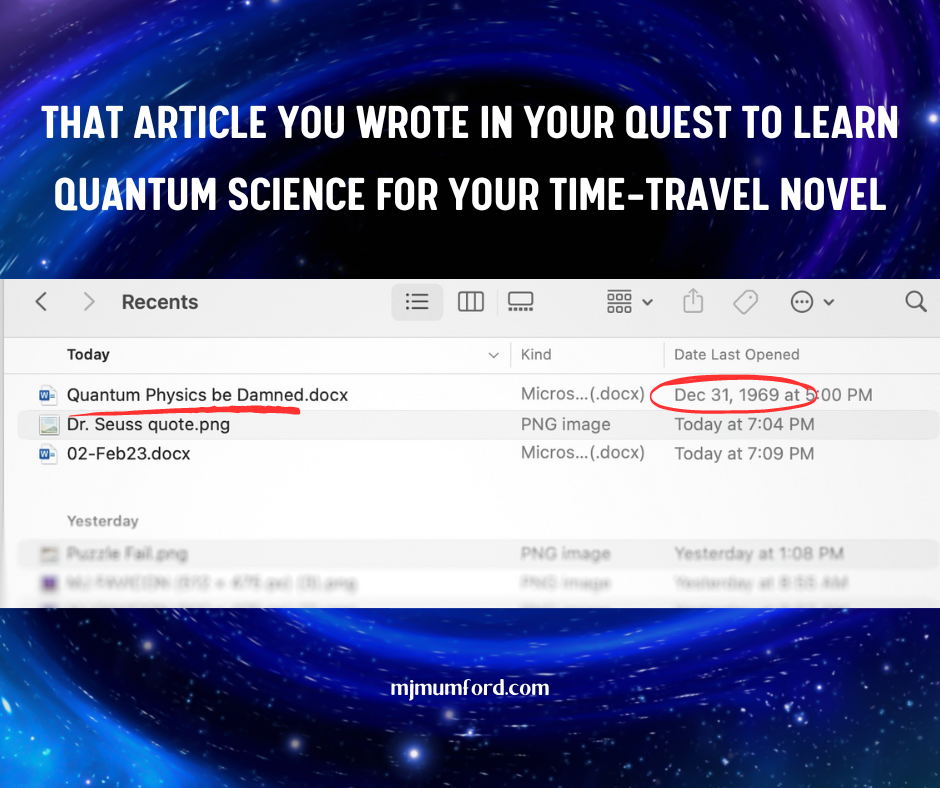As the author of two time-travel thrillers with a third one in the works, I’m feeling a little pressured by a certain group of readers.
If you’ve read the first two books in The Syd Brixton TimeBlink series, you’ll know I left out the nitty-gritty details about how a silver necklace came to have the power to transport its wearer forward or back in time. This was by design. I figured because I wasn’t especially interested in the “how” of the time travel, my readers wouldn’t be either.
However, when one reviewer commented that the time-travel element “was not explored sufficiently to be acceptable to SF readers,” the self-doubt crept in. Were my stories missing something fundamental? Did all readers need a detailed explanation about the time travel, or was it just the hardcore sci-fi fans?
Driven by an innate desire to please everyone, I decided it couldn’t hurt to clear up these questions in my final book and dove into the world of quantum physics. How hard could it be to learn the basics? (Turns out, very hard.)

The thing is, I never set out to write sci-fi books per se, at least not ones populated with aliens, spaceships, or high technology. The TimeBlink series is about everyday people who stumble on the ability to time travel and who subsequently find themselves in a shit-ton of crazy situations. They never question the power. It just is.
Can’t I leave it at that?
Perhaps, except for one minor snag. Back when I was drafting book one—back when I had no intention of writing a trilogy—I made one of my characters, um, a physicist. She appeared briefly in book two, and now in book three, she’s center stage. That’s right. I have a brilliant scientist at my disposal to explain timeblinking right down to the smallest electron. But am I obligated to do so?
No way! This is my book. I’ll write it however the hell I want.
Sorry, sci-fi purists, but as you’ve probably guessed, my stories are more metaphysically rooted than scientific. They’re also part mystery, part domestic thriller, and part love story—with vibes of The Time Traveler’s Wife, Gone Girl, and Room—which is why the more analytically minded reader might not enjoy them as much. That’s okay. There are a gazillion books out there written just for you.
For the rest of you, I gotcha covered!
My clever scientist won’t bore you with the specifics of particle accelerators, cosmic strings, or the space-time continuum. In fact, she doesn’t even step foot in a lab the whole time.
Instead, in book three, Dragonfly, (releasing 2023), you’ll find her throwing one flaming curveball after another at our feisty protagonist, Syd, whose sole mission is to rescue her sweet baby boy from a different time dimension.
Now, I ask: Which story would you rather read? Comment below!

Stephen King wrote a time travel novel about JFK assassination …he used a door of some sort that you went through ….and never explained why this door was so “magical”.
True! 11/22/63 is one of my favorite King novels in recent years. Mind you, Stephen King probably doesn’t worry about explaining himself too much.
I’m with you (just wish that I liked the idea of time travel;-) bc I luv the rest of your genres!
Thanks for the note, Lyza. It’s always so rewarding finding new readers who aren’t necessarily fans of time travel but who enjoy my stories for the other elements (suspense, mystery, and a dash of romance). Thanks for reading!
I loved TimeBlink and Flight 444. Both books are great just as they are. Can’t wait for Dragonfly!
Thanks for the positive feedback, Hetty. I’m getting down to the last few mind-blowing scenes in Dragonfly and will be sending it off to my editor for a thorough ripping apart soon. So excited!